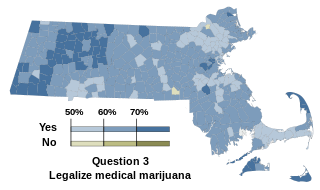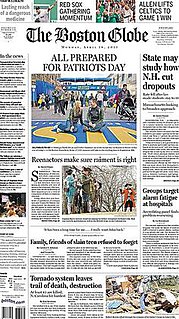
The Mayor of Boston is the head of the municipal government in Boston, Massachusetts. Boston has a mayor-council system of government. Boston's mayoral elections are non-partisan, and elect a mayor to a four-year term; there are no term limits. The mayor's office is in Boston City Hall, in Government Center.

Proposition 2½ is a Massachusetts statute that limits property tax assessments and, secondarily, automobile excise tax levies by Massachusetts municipalities. The name of the initiative refers to the 2.5% ceiling on total property taxes annually as well as the 2.5% limit on property tax increases. It was passed by ballot measure, specifically called an initiative petition within Massachusetts state law for any form of referendum voting, in 1980 and went into effect in 1982. The effort to enact the proposition was led by the anti-tax group Citizens for Limited Taxation. It is similar to other "tax revolt" measures passed around the same time in other parts of the United States. This particular proposition followed the movements of states such as California.

The State Income Tax Repeal, also known as Massachusetts Question 1, was one of the 2008 ballot measures that appeared on the November 4, 2008 ballot in the U.S. state of Massachusetts. Voters were asked whether or not they approved of the proposed measure which, if it had passed, would have ended the 5.3% income tax in Massachusetts on wages, interest, dividends and capital gains. Ultimately, Massachusetts voters defeated Question 1 by a wide margin, with approximately 70% opposed versus 30% in favor.

The Massachusetts general election, 2010 was held on November 2, 2010 throughout Massachusetts. Primary elections took place on September 14, 2010.

The Massachusetts English Language Education in Public Schools Initiative was a successful initiative voted on in the Massachusetts general election held on November 5, 2002. It was one of three 2002 ballot measures put to public vote, and the only one to pass.

Three citizen-initiated measures appeared on the November 2, 2010, ballot in Massachusetts.

The No Sales Tax for Alcohol Question, also known as Question 1, was on the November 2, 2010 ballot in Massachusetts. The measure asked voters whether or not to repeal a sales tax on alcohol sales. The ballot measure for the 2010 ballot was added after the Massachusetts State Legislature increased the sales tax in the state from 5% to 6.25% and eliminated an exemption for alcohol sold in liquor stores.

Massachusetts Question 3, filed under the name, the 3 percent Sales Tax Relief Act, appears on the November 2, 2010 ballot in the state of Massachusetts as an initiative. The measure, if enacted by voters, would reduce the state sales tax rate from 6.25 to 3 percent. The measure is being sponsored by the Alliance to Roll Back Taxes headed by Carla Howell. The measure would be enacted into a law 30 days after the election if approved by voters.

Three citizen-initiated measures were voted upon in the 2012 Massachusetts general election: a Right to Repair initiave, a proposal to allow physician-assisted suicide, and a measure to legalize medical marijuana. The Right to Repair initiative, which was to require open access to vehicle diagnostic and repair information, passed overwhelmingly, with 86% support. The measure to allow physician-assisted suicide failed by a narrow margin, with 51% opposed. The proposal to legalize medical marijuana passed with 63% of voter support.

The Massachusetts Medical Marijuana Initiative, appeared as the third question on the state's 2012 ballot as an indirect initiated state statute. The measure allows cannabis to be used for medical purposes in the state. The initiative—backed by the American Civil Liberties Union, the Massachusetts Patient Advocacy Alliance, and the Committee for Compassionate Medicine—was filed with proponents turning in the required signatures to the Massachusetts Attorney General's office by the August 3, 2011 deadline. Those signatures were needed for the required ten qualified voters who submitted the original petition to put forward the full text of the law they want enacted. The initiative passed with support from 63% of state voters.

The Massachusetts Automatic Gas Tax Increase Repeal Initiative, Question 1 was on the November 4, 2014 statewide ballot. Approved by voters, the measure repeals a 2013 law that would automatically adjust gas taxes according to inflation, allowing for automatic annual increases in the state's gas tax.

The Massachusetts Legalization, Regulation and Taxation of Marijuana Initiative also known as Question 4 is an indirect initiated state statute question to legalize, regulate and tax recreational marijuana.

The Massachusetts Charter School Expansion Initiative was an unsuccessful initiative voted on in the Massachusetts general election held on November 8, 2016. It was one of four 2016 ballot measures put to public vote.

The Massachusetts Expand Slot Machine Gaming Initiative was a 2016 Massachusetts ballot measure. Also known as Question 1, it was an indirect initiated state statute question that would allow the Massachusetts Gaming Commission to issue an additional license for another slot machine parlor to exist in the state. The ballot question specified that the additional slots parlor be licensed only on a property within 1,500 feet (460 m) of a racetrack and built on a parcel that is at least 4 acres (1.6 ha) in size. The only location in the state where this would have applied was Suffolk Downs in East Boston.

The 2018 Massachusetts general election was held on November 6, 2018, throughout Massachusetts. Primary elections took place on September 6. Early voting took place from October 22 through November 2.

The Massachusetts Gender Identity Anti-Discrimination Initiative is a state-wide referendum passed by Massachusetts voters in the 6 November 2018 mid-term election that prohibits discrimination in public accommodations on the basis of gender identity. The vote upholds language which was already present in the state anti-discrimination statute, defeating an attempt to veto it by public referendum. It is the first state-wide anti-discrimination statute passed by referendum supporting transgender rights in the United States.

The Massachusetts general election held on November 5, 2002, included three ballot measures that were voted on by the public.

The Massachusetts Casino Repeal Initiative was an unsuccessful initiative voted on in the Massachusetts general election held on November 4, 2014. It was one of four 2014 ballot measures put to public vote.

The Massachusetts Paid Sick Days Initiative was a successful initiative voted on in the Massachusetts general election held on November 4, 2014. It was one of four 2014 ballot measures put to public vote.

Three ballot measures were certified for the November 6, 2018, general election in the state of Massachusetts.







